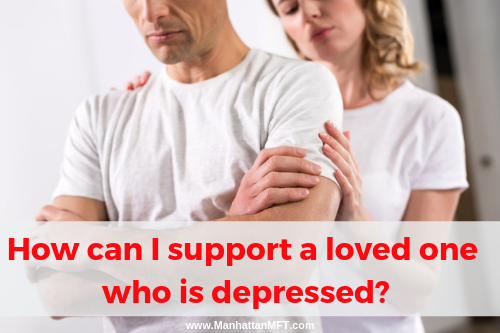Someone suffering from depression may describe feeling profoundly sad, numb or dark, and being unable to shake it. There may be days or even weeks when one toggles in and out of a depressed mood, but the darkness always comes back and brings along dread and doubt. How long will this low last this time? How dark will things get?
During a depressive episode our focus shifts from tasks, responsibilities, social events, time with friends and family, and daily living, towards pessimistic feelings about the world and unhealthy preoccupation with self. Thoughts can spiral into judgment and criticism of oneself: harsh words like “I hate myself,” “I’m not a good parent or partner,” or “I’m not that good at my job” can permeate our inner dialogue. At times like these, suicide may seem like a viable solution, a relief from desperation and self-loathing. The dire state of hopelessness and feeling of helplessness can become overwhelming and compelling enough for one to want to break the cycle by any means possible. People who have never experienced depression often think that suicide is selfish. However, a person suffering from depression has a hard time recognizing that. They often see themselves as a burden and a problem, believing that everyone and the world would be better off without them. If you know someone who is depressed: 1. Hug them. Sometimes words just don’t feel as good as a hug. A hug says I’m here and I care. Never underestimate the power of human touch. 2. Make getting help easy. Finding a therapist, making an appointment, paying for the appointment, picking up a prescription may seem just too complicated to a person struggling with daily living. Help minimize these roadblocks. 3. Check regularly with care and concern. Saying things like: “I’m thinking about you, how are you?” Or “I was driving by so I thought I’d stop by with some coffee.” 4. A depressed person might reach out quietly or subtly. Watch for their attempts. 5. If a depressed person’s life has a lot of stress, they will see that as confirmation that they are failing. Reducing stress even temporarily can help focus on getting better. 6. Have open conversations about suicidal thoughts. If we tell a depressed person “don’t think that” or “life isn’t that bad” we are just encouraging them to isolate in their dark thoughts. Be open to hearing about their pain and thoughts. 7. Depression is no one’s fault! Severe depression has biological underpinnings: we can help someone get better, but we can’t control it. “People who commit suicide don’t want to end their lives, they want to end their pain.” -Anonymous Comments are closed.
|
Categories
All
Archives
March 2023
|
[email protected]


 RSS Feed
RSS Feed